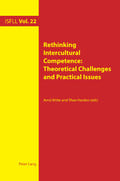
Over the past decades, the concept of intercultural competence has become an increasingly relevant construct for foreign-language teaching/learning, as well as for cognate disciplines such as pedagogy, psychology, anthropology, cultural studies, business management and others. Originally derived from Chomsky’s notion of innate linguistic competence, it has been significantly broadened and transformed into an acquired construct. This has led to the concept of intercultural competence becoming very vague and oscillating between different disciplinary approaches so that the time may be ripe now for critically rethinking the concept and reflecting on dimensions that have been overlooked.
In September 2019, a conference was held at Maynooth University to this effect. The essays in this edited volume constitute the proceedings of the conference, with topics including, among others, the virtual dimension of intercultural competence for the development of critical digital pedagogies; the application of the concept for the teaching and learning of foreign/second languages for adult migrant learners; the corporeal dimension of intercultural competence; the impact of study abroad on developing intercultural and democratic literacy; the notion of intercultural competence as ‘construalistic’ expressivity; issues of assessing intercultural competence. The volume develops a broad range of new ideas, considerations and reflections on this oscillating and still very relevant concept.
The book is published by Peter Lang.

